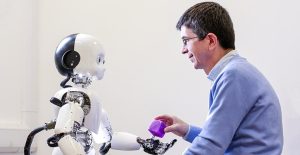Do you know A Decade from Now AI will be Beyond Human Control as Per MI? The term “singularity” refers to a time in the future when technical development, particularly in the area of artificial intelligence, will have advanced to the point at which it is capable of continuously improving itself.
The capabilities of the robots would far outweigh those of any human, and this self-improvement would cause a quick and drastic transformation in human civilisation.
This threshold may be reached within the next several decades, according to some experts, while others think it may be millennia away. The potential effects of singularity on humans are still unknown and the topic of continuous discussion and research.
However, some AI researchers are examining how well AI can perform tasks that people can accomplish in order to determine whether AI is getting near to being as good as humans.
One instance is how effectively AI can translate speech to human understanding. This is a challenging assignment for AI, but if it succeeds, it may indicate that it is getting close to matching human intelligence.
Read More: Global PS5 Sales by Sony Exceed 30 Million Units
A bold claim in this area has been made by Translated, an Italian business established in 1999 that combines a potent combination of artificial intelligence and human creativity to produce translations of consistently high quality quickly.

Marco Trombetti, CEO of Translated, recently remarked that language is the most natural thing for people. Data gathered by Translated plainly demonstrates that machines are close to crossing the gap and achieving singularity.
Trombetti claimed that the business used a metric called “Time to Edit” to track how well their AI performed at translating from 2014 to 2022. This metric contrasts the time it takes for human editors to correct translations produced by AI with those produced by humans.
Translated came to the conclusion that AI is improving and is coming closer to being as effective as human translators after studying more than 2 billion translations and eight years’ worth of data.
Trombetti claims that editing the work of another human translator normally takes one second per word. Professional editors can now assess a machine-translated recommendation in 2 seconds as opposed to the 3.5 seconds they needed to do so in 2015. By the end of the decade, if this pattern holds, Translated’s AI is anticipated to match human translators’ accuracy levels.
According to Translated’s findings, if not sooner, singularity may be attained by the end of this decade.



